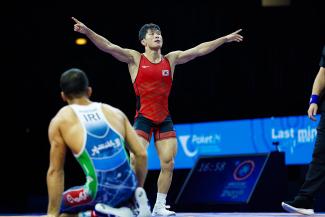Russian Cadets Match Junior Squad, Sweep European Team Races
Sunday, June 23, 2019 - 22:51 By Eric Olanowski

FAENZA, Italy (June 23) – The Cadet European Championships came to a close on Sunday night with five different nations claiming individual freestyle golds, but it was the Russian Federation who grabbed the team title to pick up their second straight continental sweep. Their junior team also won the freestyle, Greco-Roman and women's wrestling team tiles two weeks ago in Pontevedra, Spain.
Overall, through the three cadet, junior and senior European Championships, Russia has accumulated eight out of nine team titles. They swept the cadet and junior European Championships, while also finishing with two of three team titles at the Senior European Championships. So far, Ukraine’s women’s wrestlers are the only ones to dethrone the Russians in a team race.
In Faenza, Russia’s freestyle team capped off their run to a third team title of the week with nine medals and were ten points shy of hitting 200 points. They welcomed their 190 points from four champions, a silver medalist, and four bronze medals.
They had a trio of Day 6 champions and grabbed their fourth freestyle gold medal of the competition when Abdulkerim ABDULAEV (RUS) demolished Davit KUTCHUASHVILI (GEO), 10-0 in the 72kg gold-medal bout to close out the tournament.
In the finals, Abdulaev dug his toes in the mat and pushed Kutchuashvili out of bounds shortly after being awarded an inactivity point and collected the two-point advantage over the Georgian heading into the final two minutes of the match.
In the second period, Abdulaev halted Kutchuashvili’s knee pull single off the whistle and picked up a counter-offensive spin behind. This extended his lead to 4-0. Abdulaev quickly jumped to a left-sided gut wrench then hopped over, locking up a trap arm gut wrench. The Russian ended the match with a pair of turns and won his first European title since winning gold at the 2017 U15 European Championships in Belgrade, Serbia.
Azerbaijan finished in second place with a solo champion, a pair of runner-ups, and four bronze-medal finishers. Their lone gold medalist came on Sunday night when Sabir JAFAROV (AZE) defeated Genik ASATRYAN (ARM), 6-1 in the 60kg finals.
Georgia ended their tournament with 140 points, which was good enough for third in the team race. Nikolozi SANTELADZE (GEO) reached the top of the podium on Sunday with a 12-5 win against Murad HAGVERDIYEV (AZE) in the 45kg finals. They also had two wrestlers fall short in the finals and had to settle for a pair of silvers, while also finishing with three bronze medalists.
Final Freestyle Team Scores
GOLD – Russia (190 points)
SILVER – Azerbaijan (153 points)
BRONZE – Georgia (140 points)
Fourth – Armenia (102 points)
Fifth - Ukraine (87 points)
45kg
GOLD - Nikolozi SANTELADZE (GEO) df. Murad HAGVERDIYEV (AZE), 12-5
BRONZE - Tolga OZBEK (TUR) df. Anzor MAZHIDOV (RUS), 8-4
BRONZE - Mikita BERAZUN (BLR) df. Stefan SHTERJOV (MKD), 4-2
51kg
GOLD - Mykyta ABRAMOV (UKR) df. Giorgi GOGRITCHIANI (GEO), 16-6
BRONZE - Kanan HEYBATOV (AZE) df. Ilya RAHOZAU (BLR), 10-0
BRONZE - Umar UMAROV (RUS) df. Pavel GRAUR (MDA), 8-1
60kg
GOLD - Sabir JAFAROV (AZE) df. Genik ASATRYAN (ARM), 6-1
BRONZE - Ayub Muratovitch MUSAEV (BEL) df. Alexandru Ioan MATEA (ROU), 10-0
BRONZE - Daniil KHARCHILAVA (RUS) df. Daviti ABDALADZE (GEO), 8-2
71kg
GOLD - Abdulkerim ABDULAEV (RUS) df. Davit KUTCHUASHVILI (GEO), 10-0
BRONZE - Muhammed Halit OZMUS (TUR) df. Gabriel IGLESIAS RAMOS (ESP), 10-0
BRONZE - Menua YARIBEKYAN (ARM) df. Lilian BALAN (MDA), 6-4
92kg
GOLD - Lyova GEVORGYAN (ARM) df. Islam KARTOEV (RUS), 6-3
BRONZE - Sagadulla AGAEV (AZE) df. Redjep HAJDARI (MKD), 15-2
BRONZE - Omer AGTAS (TUR) df. Saba GAMTENADZE (GEO), 10-0


Share your thoughts.
Comments